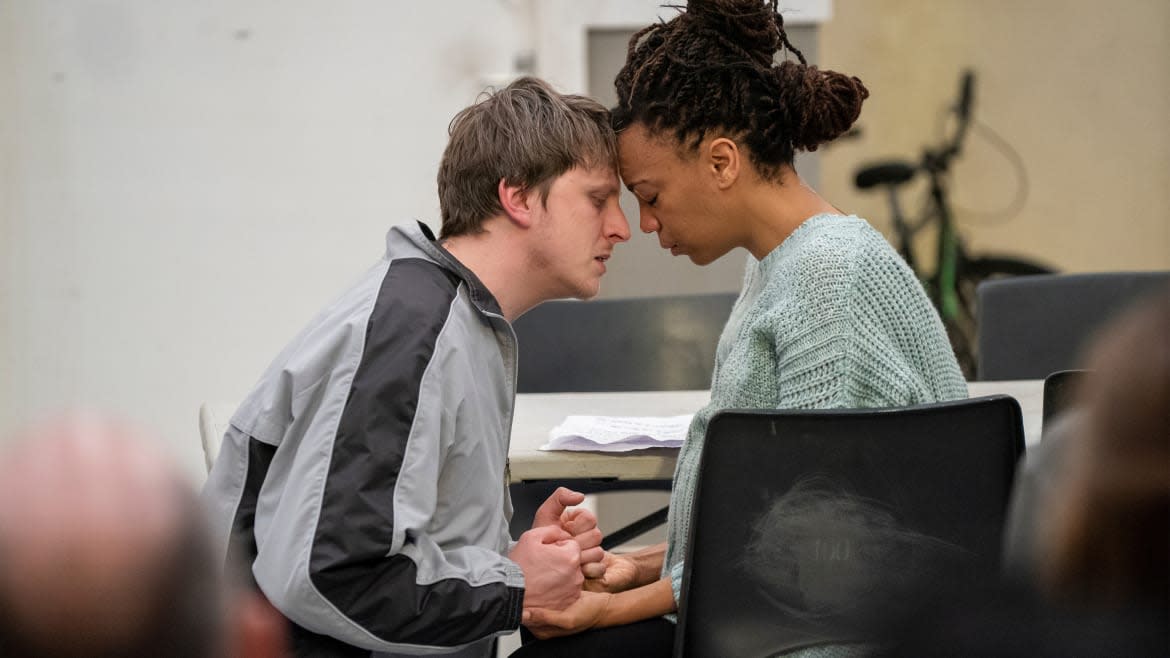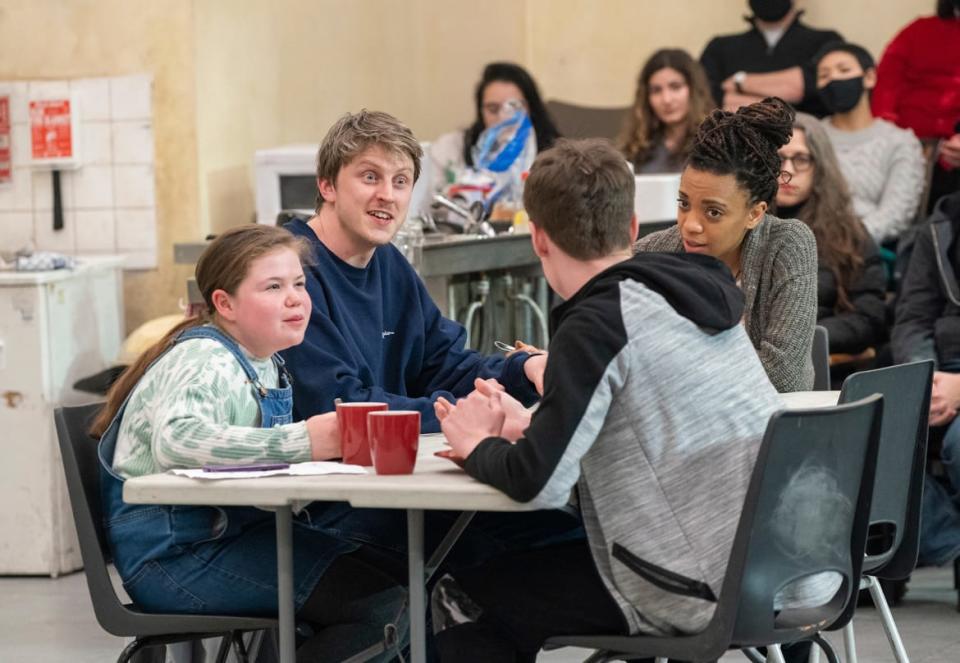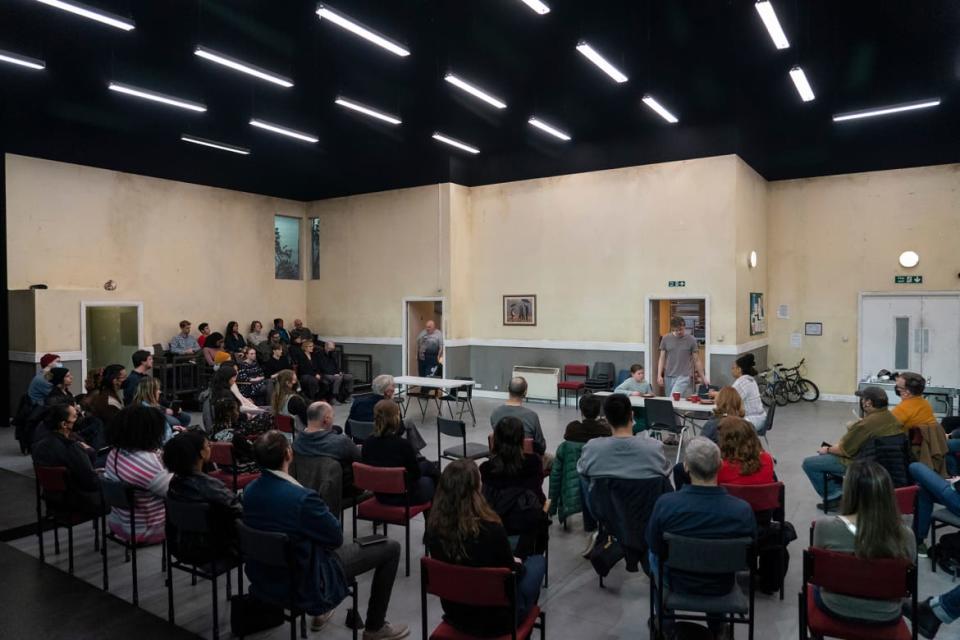‘LOVE’ Is Stark, Powerful—and the Best New Play in New York

- Oops!Something went wrong.Please try again later.
The most powerful piece of theater currently being staged in New York is taking place in one of its most stunning performance spaces. LOVE (to March 25), written and directed with a stark precision by Alexander Zeldin, is about the residents of a British temporary housing facility, a halfway house while their applications for full-time accommodation are processed. Their precarious situations are mirrored in the play’s naturalistic acting, direction, and Natasha Jenkins’ pungently evocative design of the communal living space where the action takes place.
In the cavernous interior of the Park Avenue Armory’s Wade Thompson Drill Hall, we alight upon a linear strip of institutional, yellow, scuffed walls, basic table, fire exit signs, a sink, and a shared bathroom and individual bedrooms whose interiors we only glancingly see. Outside are tree branches tapping ominously on a window.
This is a communal home stripped of all the niceties of living communally and of home. It is a place of desperation. Marc Williams’ all-too-realistic overhead lighting floods not just the facility with light but also the audience—and then, between scenes or at night, throws us into a soft half-light or total darkness. There are also audience seats on the stage; that the hostel setting bleeds out into the audience area comes to play a significant thematic role as the play nears its climax.
Homelessness Just Keeps Getting Worse. Here’s How to Help.
In LOVE, we meet Dean (Alex Austin), 31, an apprentice electrician, his partner Emma (Janet Etuk), who is training to be a massage and wellness therapist, and is a stepmother to the children, his 8-year-old daughter Paige (Amelia Finnegan/Grace Willoughby in other performances) and 12-year-old son Jason (Oliver Finnegan).
In the neighboring room are Colin (Nick Holder), in his 50s, and his physically and psychologically deteriorating mother Barbara (Amelda Brown). Periodically entering the space are Tharwa (Hind Swareldahab), a fortysomething Sudanese refugee without her children, and Adnan (Naby Dakhli), a Syrian man in his mid-30s, who has recently been granted asylum.
Every actor is excellent, conveying through spare speech, glances, and nervy movement the various desperations their characters face, the confined space they live in, as well as the suspicion they have of their neighbors, the daily grind of trying to get out of this place to full-time accommodation, while also getting chores done, and trying to remain positive as options are in play and all too quickly and cruelly close.
Zeldin is known for plays that, like LOVE, focus on social issues, grounded in research and real-life case studies—although, he recently told the New York Times, “I don’t see what I do as docu-theater at all. My script is about music. It’s about rhythm. Very modestly, that’s the ambition.”
Watching the characters in LOVE go through what they do is a tense experience—in terms of theme and indicting intention, it reminded this British critic of Ken Loach’s just-as-stark 1966 BBC television play, Cathy Come Home, about homelessness, and a vulnerable central character playing an impossibly weighted game of snakes and ladders with the state. Nearly 60 years later, LOVE—originally staged at London’s National Theatre in 2016—is being performed at a time of a cost of living crisis in Britain, with The Observer recently reporting that more people in the country are depending on food banks than ever before (as do Dean and Emma in LOVE).

'LOVE' at Park Avenue Armory.
In the play, the fight for dignity and the preservation of self is all. In the facility, where everything is on the line and where people have so little, possessions matter. What you have, which is not much, stands for so much. Shredded personal dignity is held on to tightly. Offense is easily and heartbreakingly taken, in fights over mugs being used or shelf-space for food. Territories are zealously guarded, bathroom visits require diplomacy.
Our main focus is on Dean and Emma, and a brewing conflict between them and Colin, as both parties cling on to hopes of getting places of their own. As much as the play highlights the big issues of the housing and homelessness crisis, it is also about personal disconnection and connection. Among all the characters we see the awkwardness of sharing a space, yet not knowing how to connect with others in that space—or wanting to. No one wants to be in this environment for long; there is a silent, shared sense of focusing on leaving rather than foster any bonds that would root you in this space for any longer than necessary.
The language—a litany of British colloquialisms and profanity—is as naturalistic as the acting and setting. We see faceless bureaucracy viciously penalizing Dean. We watch the insistence on normality; Dean and Emma making the kids their dinner, and the family unit sitting at the table to eat—and the ghastly, all-too-revealing sound of cutlery scraping every last bit of soup from their plates. We see how meager the portions are. They can only afford tinned vegetables, not fresh. Paige can’t have her favorite breakfast cereal. Every penny is being ferociously fought for and saved. Every last bit of effort is being made to build some kind of life.
We initially think Colin might be malevolent, a racist. He seems nosy, he looks at the white skin of Dean’s children, and says to the Black Emma, “Not yours, then.” Yet he is devoted to his ailing mother; he washes her hair tenderly. He is also trying to find them a home. She loves him too, but knows she is a burden; her mortality is on both their minds. And then there is just the battle to get her to the bathroom on time—and one of these incidents brings the play to its central, shocking crisis point.
This crisis brings the title of the play into its sharpest focus. We see the love—the depth of it, the cost of it, the many meanings of it, not all positive—that the characters feel for those closest to each other. We see frustration and anger boil over, but all of it is rooted in love, and what we do and say in its name. Colin, far from a creepy lout, is shattered—a scared and terrified man-boy—by the play’s end. Etuk as Emma in this scene is also a volcano of emotions, furious at having to clean up yet more mess, and furious at so much more, but also knowing what she must do.
The presences of Tharwa and Adnan in LOVE are more fleeting. This critic would have liked to have seen and learned more of their experiences, and seen them integrated more into the play. But it is significant that in one key scene they speak Arabic to each other, and we see them be just as animated as the other characters are speaking English; we can also deduce, hilariously, Tharwa setting the world to rights—from their facility neighbors to the parlous quality of shop-bought fruit juice.

'LOVE' at Park Avenue Armory.
Given how intense and fraught LOVE is, it is important to note that there is humor too. Finnegan as Paige is a joy, singing enthusiastically, if tunelessly, in preparation for her nativity play. Barbara twinkles when she sees Paige, happy and hopeful for her life to come, and nostalgic for her own youth long gone. Family life for Dean, Emma, Paige and Jason—with all its quotidian joys, conflicts, comings-together, and day-to-day school-runs and homework, and vicious sibling fights—continues.
The putting up of Christmas decorations is a merry act of defiance of circumstance, an insistence on joy. Even the characters trying and failing to communicate has its funny side. The play emphasizes love, and acting lovingly, as a far-from-hokey weapon in the fight to survive. Music does not just lift the mood via Paige. Tharwa sings a climactic Arabic song as an affirmation of love after the line cuts out while speaking to her daughter. (The lullaby, a show spokesperson told The Daily Beast, is a song that Hind Swareldahab’s mother sang to her, and has been passed down for generations in her family. According to Swareldahab, it is a well-known song in Central Sudan; she herself is a Sudanese refugee, like her character, and suggested the song to Zeldin for inclusion in the play.)
The program for the play contains a note from Zeldin, and a short essay by Jacquelyn Simone, MPA, an activist and writer who worked at the Coalition for the Homeless from 2014 to earlier this year, where she advocated for long-term solutions to mass homelessness in New York City.
Simone’s point is that while an ocean may separate the circumstances we see on stage in Britain to where we sit in New York, the possibility, ordeal, and impact of homelessness is one faced by many—especially in big cities where rents are so high, and what people pay for rent can be as much as half, sometimes over half, of their income. If a job is lost, the specter of losing one’s home becomes a not only very real, but also a very immediate threat.
The horrendous incident which occurs near LOVE’s end preceding Tharwa’s lullaby could be a degrading narrative peak in another drama, but Zeldin clearly wants to major on individual and shared humanity. We see this throughout the play—its clear resistance to making Colin a racist lout, its careful drawing of every character and their dignities, and on the binding principle of the play’s title. Zeldin ultimately brings us to a moment when Barbara herself approaches the audience. Her character is physically frail, and she advances towards audience members with her hands out for their help.
The play has been so real-feeling, this breaking of the fourth wall could seem one step too fancifully far. But the central mission of LOVE is not just an appeal to liberal audiences to feel its characters’ pain, and to passively empathize. It is seeking a more active engagement—an empathy based in doing something, fighting for something, recognizing something, of truly opening our eyes, minds, and hearts to others. In achieving this aim (in spades) LOVE does not proselytize, it simply shows and explores. It does not shock cheaply, but rather—brutally, brilliantly, forcefully—with clarity.
Get the Daily Beast's biggest scoops and scandals delivered right to your inbox. Sign up now.
Stay informed and gain unlimited access to the Daily Beast's unmatched reporting. Subscribe now.

